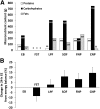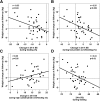Energy Expenditure Responses to Fasting and Overfeeding Identify Phenotypes Associated With Weight Change
- PMID: 26185280
- PMCID: PMC4613969
- DOI: 10.2337/db15-0382
Energy Expenditure Responses to Fasting and Overfeeding Identify Phenotypes Associated With Weight Change
Abstract
Because it is unknown whether 24-h energy expenditure (EE) responses to dietary extremes will identify phenotypes associated with weight regulation, the aim of this study was to determine whether such responses to fasting or overfeeding are associated with future weight change. The 24-h EE during energy balance, fasting, and four different overfeeding diets with 200% energy requirements was measured in a metabolic chamber in 37 subjects with normal glucose regulation while they resided on our clinical research unit. Diets were given for 24 h each and included the following: (1) low protein (3%), (2) standard (50% carbohydrate, 20% protein), (3) high fat (60%), and (4) high carbohydrate (75%). Participants returned for follow-up 6 months after the initial measures. The decrease in 24-h EE during fasting and the increase with overfeeding were correlated. A larger reduction in EE during fasting, a smaller EE response to low-protein overfeeding, and a larger response to high-carbohydrate overfeeding all correlated with weight gain. The association of the fasting EE response with weight change was not independent from that of low protein in a multivariate model. We identified the following two independent propensities associated with weight gain: a predilection for conserving energy during caloric and protein deprivation and a profligate response to large amounts of carbohydrates.
© 2015 by the American Diabetes Association. Readers may use this article as long as the work is properly cited, the use is educational and not for profit, and the work is not altered.
Figures






References
-
- Dériaz O, Fournier G, Tremblay A, Després JP, Bouchard C. Lean-body-mass composition and resting energy expenditure before and after long-term overfeeding. Am J Clin Nutr 1992;56:840–847 - PubMed
-
- Dulloo AG, Jacquet J. Low-protein overfeeding: a tool to unmask susceptibility to obesity in humans. Int J Obes Relat Metab Disord 1999;23:1118–1121 - PubMed
-
- Klein S, Goran M. Energy metabolism in response to overfeeding in young adult men. Metabolism 1993;42:1201–1205 - PubMed
-
- Ravussin E, Schutz Y, Acheson KJ, Dusmet M, Bourquin L, Jéquier E. Short-term, mixed-diet overfeeding in man: no evidence for “luxuskonsumption”. Am J Physiol 1985;249:E470–E477 - PubMed
-
- Weyer C, Vozarova B, Ravussin E, Tataranni PA. Changes in energy metabolism in response to 48 h of overfeeding and fasting in Caucasians and Pima Indians. Int J Obes Relat Metab Disord 2001;25:593–600 - PubMed
Publication types
MeSH terms
Substances
Grants and funding
LinkOut - more resources
Full Text Sources
Other Literature Sources
Medical

